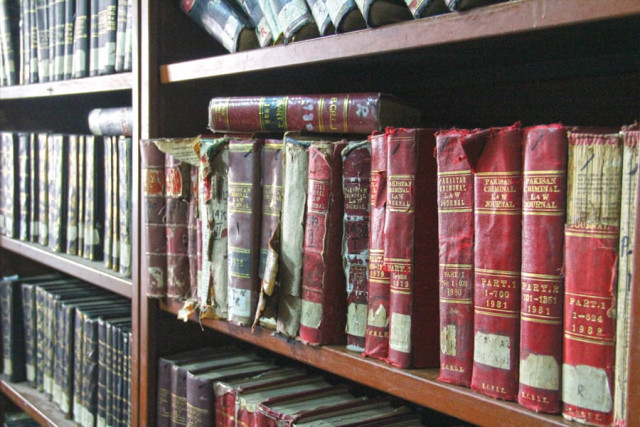With over 60,000 books, judicial library contains history and evolution of subcontinent’s law
The priceless resources are looked after by a smiling librarian - its ‘spider’.

The judicial library set up for the judges of the Sindh High Court holds the entire collection of cases from as early as the 1800s. PHOTO: AYESHA MIR/EXPRESS
Ibrahim, 46, is happy to be recognised as the caretaker of the country’s word of law —ironically kept in the heart of perhaps its most lawless city — and earned his nickname thanks to the nimble way with which he climbs up a ladder to bring down out-of-reach books.
The judicial library is built on the ground floor of the Sindh High Court (SHC), which was once the Chief Court under the British Raj for the Sindh-Balochistan region. The library, built with a rare pink stone found in the Indian city of Jodhpur, contains reports and journals with hundreds of thousands of judgments that can be cited as precedents, some of which date to the 18th century.
“These judgments, rendered by English judges, are rare in nature,” Ibrahim tells The Express Tribune, gently cleaning dust off a heavy hardbound book. “Some of these date to the early 1800s.”
The library has been an integral part of the SHC building since the late 1800s and is only used by judges — a mere 30 of them.
A vast array
Ibrahim is responsible for taking care of the over 60,000 law books, reports and journals inside the library. “A majority of these books carry hallmark and groundbreaking decisions rendered in the subcontinent — both pre- and post-partition,” he reveals. “Some journals contain judgments written over two centuries ago — judgments made by the King’s Bench, the Queen ‘s Bench and the Chancellor’s Bench.”
Most of the books in the collection are printed in the United Kingdom, while others are printed in India. A small chunk is even published in America.
“Since our Constitution is based on those of Britain and India, their judgments provide vital precedence when deciding litigation under our own,” says Ibrahim, explaining how the books maintain their relevance, defying the passage of time.
As more books arrive, the library is no longer confined to the room. The walls of the corridors behind the courtrooms now have wooden shelves, where hundreds of books are carefully arranged behind glass.
Most of them are large, heavy and expensive. “One recently imported book on Company Law is worth Rs200,000,” claims Ibrahim. “A few others can cost up to Rs250,000.”
Priceless resources
The collection does not end there. Pakistan is often referred to as a ‘laboratory of constitutional experiments’ - experiments that, over the years, have resulted in varying judgments. And it is these varying judgments that form a large chunk of the library’s collection.
Pakistan Law Decisions (PLD) is the most comprehensive law resource — a favourite for many a lawyer. Published monthly, the PLD contains judgments from the Supreme Court of Pakistan as well as its high courts and tribunals, along with those of the superior courts of territories such as the Azad Kashmir.
“PLD has been published every month since 1947,” says the librarian. “This is the most sought-after report and many lawyers buy it on their own to keep themselves updated.”
Constitutional ‘experiments’
The library has more to offer. Gazette notifications issued by the country’s governor-generals and presidents can also be found on the shelves.
The librarian, with a small distinct beard that now has a hint of grey, joined three days after the 1999 military coup — an era that saw further constitutional and legal ‘experiments’.
“After the coup, the additions to our library were the copies of the Provisional Constitutional Orders (PCOs), then the National Reconciliation Ordinance and the law concerning the appointment of judges to the superior courts. All the PCOs issued by former military dictators are also part of our archives collection,” says Ibrahim.
The times are a-changin’
The country has faced increased violence and security challenges over the past few decades and the repercussions reverberate in the library.
“The demand for laws relating to violence has increased during recent years, especially since various amendments have been made to special laws, including the Anti-Terrorism Act and the National Accountability Ordinance,” says Ibrahim.
During this era, the Contempt of Court Ordinance 1976 was replaced by the Contempt of Court Ordinance 2003, and other laws on environment, culture and heritage have also been changed.
The country, founded by a lawyer, has overseen a historic movement by the legal fraternity against the ‘cuffs’ on the judiciary, which ended with the start of a judicial activism movement.
Ever since judicial activism found its roots in the corridors of the historic court, judgments that annulled anti-democracy and anti-human right laws have become part of the library.
Smiling, the librarian says that one day, someone will replace him and become the new spider of the high court — and the library, will move on.
Published in The Express Tribune, April 1st, 2014.



















COMMENTS
Comments are moderated and generally will be posted if they are on-topic and not abusive.
For more information, please see our Comments FAQ